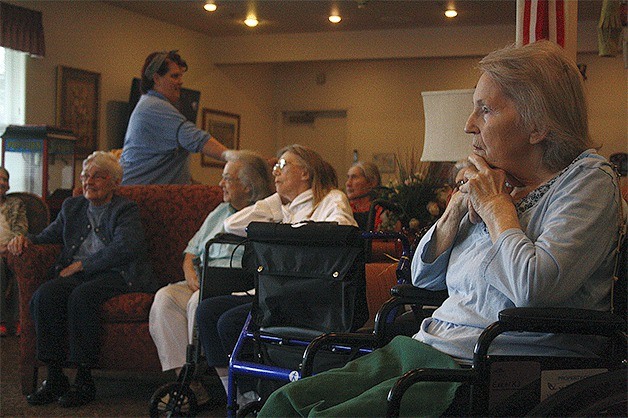HomePlace Special Care Center strives to bring joy to the lives of its 48 residents.
The center specializes in care of patients with Alzheimer’s and dementia.
“If you are always aiming for joy for the residents, for the caregivers, for your fellow staff members, you’ll always make the right decisions,” said Executive Director Mary Gould.
“Joy is probably the secret to life.”
The center is divided into three “neighborhoods,” according to its Health Services Director Danell Broyles.
The residents are placed in a specific neighborhood based on how advanced their dementia is.
Gould described the stages as “beginning,” “middle” and “end.”
“We try to keep them active physically; we try to keep them engaged mentally,” Broyles said. “We try to keep them from being bored.”
The center schedules activities daily for the residents and is currently holding a weeklong session of making apple butter. The finished product will be sold at a bake sale, set for 10 a.m. Saturday, Aug. 30, outside of the Oak Harbor Walmart.
Proceeds from the bake sale will go toward Alzheimer’s research.
“We’re just always looking for ideas for them to learn and ideas for them to continue to grow or feel that they’re growing as human beings,” Gould said.
The caregivers at HomePlace take a “gentle care” approach, combined with Montessori educational activities.
“There is a type of learning that can go on even for people with dying brains,” Gould said. “It relies on routine and small steps and repetitive small-motor movements.”
Mitch Incarnato’s mother, Marlene, lives at HomePlace.
Marlene Incarnato, who has Alzheimer’s disease, has been a resident at HomePlace since November 2010. Incarnato said he cared for his mother at home for six years before that.
Incarnato said he turned to HomePlace to help with the advanced car his mother needed.
“It’s obviously a very, very difficult disease for the caregivers to deal with,” he said. “I’m really glad I was in a position to take care of her as long as I did.”
Now, Incarnato works as a volunteer at HomePlace, visiting the center every day during breakfast to serve food and drinks, set up the tables and feed his mother.
“I think, with Alzheimer’s’s … you have to know when to let go,” he said.
“It’s a tough one.”
The most difficult thing about treating dementia and Alzheimer’s patients isn’t the care itself, Broyles said.
“What I find difficult is not how I handle their dementia, but … the ones that are alert enough to know that they’re confused,” she said.
“It’s hard emotionally to watch them go through that.”
Broyles said she agrees with Gould — that the best part of what she and the other staff members do is help bring joy to the residents’ lives.
“When you bring a little bit of joy into their life, knowing it’s a dementia person, someone who may not remember five minutes from now, but you still put a smile on their face for that moment, that’s all that matters,” she said.
“You’re not just here to make sure they eat and drink and go to the bathroom, you’re here to participate in their lives, to talk to them,” she said.
“This isn’t a job you come to just because you need a job. This is a job you come to because you care about people.
“We’re all here because we care.”



